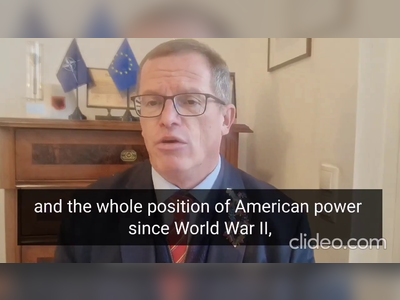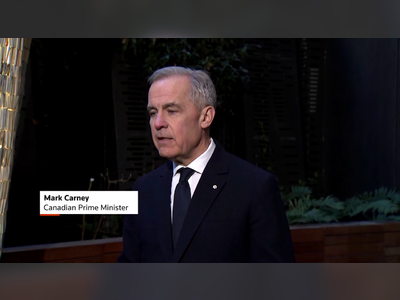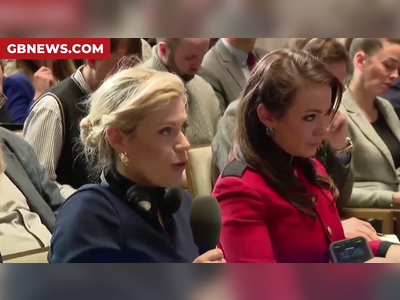America's Debt Dilemma: Holding the Fort or Failing Fiscal Foresight?
Averting a Shutdown Highlights the Persistent Tug-of-War over the Debt Ceiling and Fiscal Prudence
The United States recently averted yet another last-minute government shutdown, a recurring drama that has held the nation at the edge of its seat multiple times over recent years.
The resolution?
A transitional budget, crafted in a moment of political urgency, sidestepping former President Donald Trump's contentious call to abolish the debt ceiling altogether.
While some herald this move as a display of bipartisan cooperation, others critique it as a mere temporary fix—a 'Band-Aid on a bullet wound,' as the adage goes.
The debt ceiling, a construct initially designed to impose fiscal discipline, now frequently manifests as a political flashpoint threatening governmental paralysis.
Critics of the current system argue that it forces Congress into repetitive cycles of brinkmanship, overshadowing genuine fiscal planning.
Without structural reform, these provisional measures offer scant relief from the looming specter of fiscal mismanagement.
On the face of it, dispensing with the debt ceiling, as Trump suggested, might seem attractive, akin to a homeowner dispensing with a credit card limit—ushering in potential financial chaos.
Critics worry about the erosion of fiscal discipline, fearing an unrestricted budget could lead to imprudent expansions.
Meanwhile, defenders of the status quo argue that the ceiling enforces necessary spending restraints.
The sequestration debates serve as historical reminders of how budget caps can occasionally enforce fiscal prudence.
Nonetheless, the relentless cycle of provisional budgets spurs an environment of uncertainty.
This disruption not only undermines the day-to-day functioning of government agencies but erodes public confidence in financial governance.
As debates over fiscal responsibility continue, could a radical rethinking of the debt ceiling offer a solution?
One provocative suggestion posits linking the debt ceiling to economic metrics rather than political negotiations, aligning government spending with the nation's fiscal health.
Such a metrics-based ceiling could provide the flexibility needed to manage economic expansions, reducing reliance on arbitrary cuts.
Yet, crafting consensus on appropriate metrics could prove another test of political will.
Achieving a balance between necessary flexibility and accountability could redefine fiscal responsibility in American politics.
As the nation teeters between short-term fixes and long-term solutions, policymakers face a daunting challenge: to reform a process perceived as antiquated and politically volatile.
The resolution lies not in partisan victories or defeats, but in reimagining how America manages its fiscal strategy.
As Aristotle wisely said, 'The whole is greater than the sum of its parts,' a dictum that might well guide the renewal of budgeting practices and restore confidence in governance.
The resolution?
A transitional budget, crafted in a moment of political urgency, sidestepping former President Donald Trump's contentious call to abolish the debt ceiling altogether.
While some herald this move as a display of bipartisan cooperation, others critique it as a mere temporary fix—a 'Band-Aid on a bullet wound,' as the adage goes.
The debt ceiling, a construct initially designed to impose fiscal discipline, now frequently manifests as a political flashpoint threatening governmental paralysis.
Critics of the current system argue that it forces Congress into repetitive cycles of brinkmanship, overshadowing genuine fiscal planning.
Without structural reform, these provisional measures offer scant relief from the looming specter of fiscal mismanagement.
On the face of it, dispensing with the debt ceiling, as Trump suggested, might seem attractive, akin to a homeowner dispensing with a credit card limit—ushering in potential financial chaos.
Critics worry about the erosion of fiscal discipline, fearing an unrestricted budget could lead to imprudent expansions.
Meanwhile, defenders of the status quo argue that the ceiling enforces necessary spending restraints.
The sequestration debates serve as historical reminders of how budget caps can occasionally enforce fiscal prudence.
Nonetheless, the relentless cycle of provisional budgets spurs an environment of uncertainty.
This disruption not only undermines the day-to-day functioning of government agencies but erodes public confidence in financial governance.
As debates over fiscal responsibility continue, could a radical rethinking of the debt ceiling offer a solution?
One provocative suggestion posits linking the debt ceiling to economic metrics rather than political negotiations, aligning government spending with the nation's fiscal health.
Such a metrics-based ceiling could provide the flexibility needed to manage economic expansions, reducing reliance on arbitrary cuts.
Yet, crafting consensus on appropriate metrics could prove another test of political will.
Achieving a balance between necessary flexibility and accountability could redefine fiscal responsibility in American politics.
As the nation teeters between short-term fixes and long-term solutions, policymakers face a daunting challenge: to reform a process perceived as antiquated and politically volatile.
The resolution lies not in partisan victories or defeats, but in reimagining how America manages its fiscal strategy.
As Aristotle wisely said, 'The whole is greater than the sum of its parts,' a dictum that might well guide the renewal of budgeting practices and restore confidence in governance.
Translation:
Translated by AI
AI Disclaimer: An advanced artificial intelligence (AI) system generated the content of this page on its own. This innovative technology conducts extensive research from a variety of reliable sources, performs rigorous fact-checking and verification, cleans up and balances biased or manipulated content, and presents a minimal factual summary that is just enough yet essential for you to function as an informed and educated citizen. Please keep in mind, however, that this system is an evolving technology, and as a result, the article may contain accidental inaccuracies or errors. We urge you to help us improve our site by reporting any inaccuracies you find using the "Contact Us" link at the bottom of this page. Your helpful feedback helps us improve our system and deliver more precise content. When you find an article of interest here, please look for the full and extensive coverage of this topic in traditional news sources, as they are written by professional journalists that we try to support, not replace. We appreciate your understanding and assistance.











